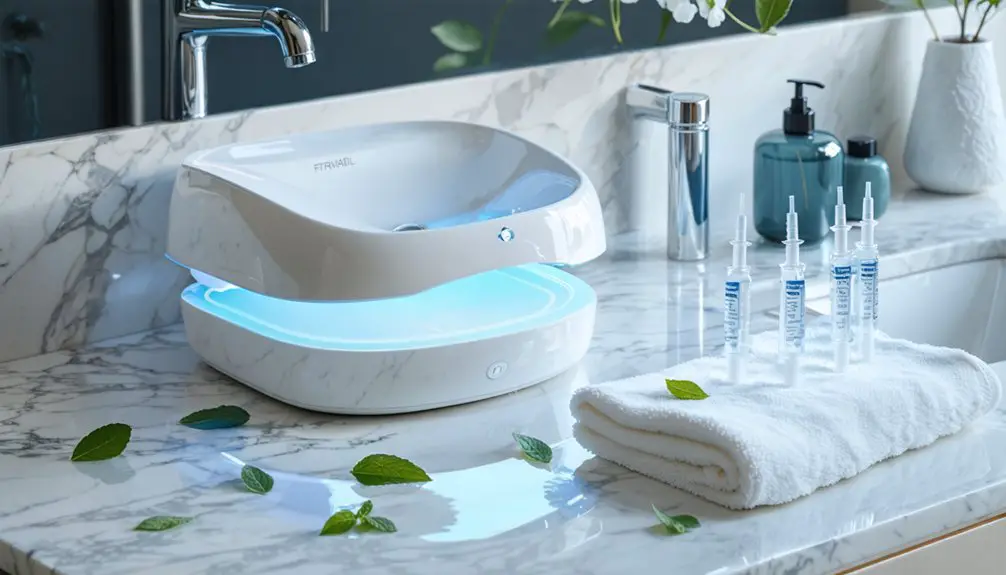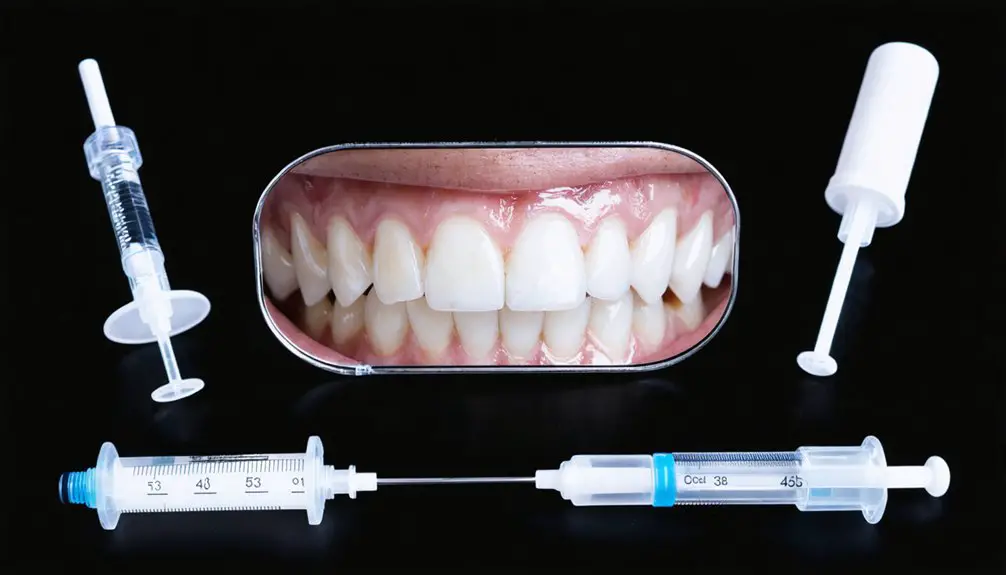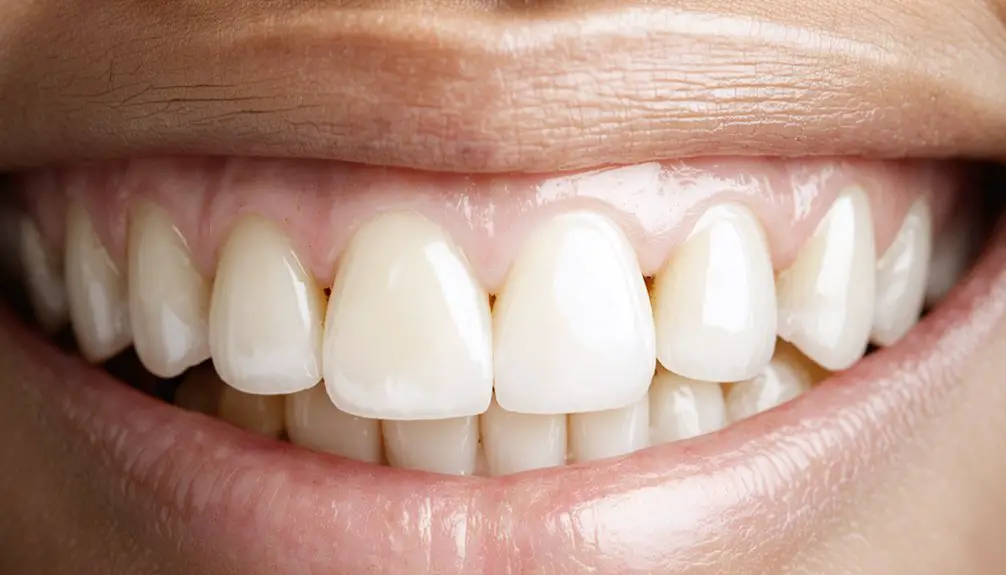You’ll transform your self-care routine by adding teeth whitening treatments that deliver both cosmetic enhancement and psychological benefits. Professional treatments offer dramatic results in just one hour, while at-home options provide gradual improvement over weeks. Regular whitening can boost your confidence, improve social interactions, and enhance your professional presence. Follow proper safety protocols and maintenance routines to protect your oral health while achieving that perfect smile. The path to lasting confidence starts with understanding your whitening options.
Key Takeaways
- Professional teeth whitening treatments boost confidence and self-esteem, creating a positive impact on social and professional interactions.
- Choose between professional in-office treatments for quick results or at-home kits for gradual improvement over several weeks.
- Maintain whitening results by following a white diet and practicing good oral hygiene with whitening toothpaste.
- Schedule treatments strategically before special events, allowing at least two weeks for optimal results.
- Combine teeth whitening with sustainable oral care habits, including eco-friendly products and water conservation practices.
The Psychology Behind a Brighter Smile
While many people seek teeth whitening primarily for cosmetic reasons, the psychological impact of a brighter smile extends far beyond mere aesthetics.
Research shows that smile psychology plays an essential role in how you interact with others and perceive yourself. When you’re confident about your teeth, you’ll engage more freely in social situations and experience reduced anxiety in professional settings. Studies consistently show that individuals with whiter teeth are viewed as successful.
A confident smile transforms both social and professional interactions, empowering you to engage authentically and connect more deeply with others.
Your emotional well-being greatly improves as dental-related self-consciousness diminishes. Clinical studies demonstrate that teeth whitening leads to improved mental health outcomes.
You’ll find yourself more willing to participate in group discussions, speak up in meetings, and embrace social opportunities you might’ve previously avoided.
The positive feedback loop is clear – as you smile more confidently, you’ll receive more favorable responses from others, which further enhances your self-esteem and overall quality of life.
Understanding Professional vs. At-Home Whitening Options
When choosing between professional and at-home teeth whitening options, you’ll need to weigh several key factors that impact your results and experience.
Professional techniques offer powerful whitening effectiveness with 25-40% peroxide concentrations, delivering up to eight shades lighter teeth in a single session.
At-home solutions, while more affordable at around $50, contain 3-10% peroxide and require weeks of consistent use for modest results.
Consider treatment costs carefully – professional services average $300 but provide longer-lasting outcomes under dental supervision. Most dental insurance plans do not provide cosmetic whitening coverage.
Both methods may cause tooth sensitivity and gum irritation as common side effects during treatment.
While at-home options offer flexibility in application methods, they demand strict adherence to safety measures to prevent sensitivity and uneven results.
Your individual preferences for speed, budget, and maintenance will determine which approach best serves your whitening goals and long-term results.
How Teeth Whitening Boosts Social Confidence
Beyond the technical aspects of teeth whitening, the psychological impact of a brighter smile can transform your social confidence and overall well-being. Research shows that whitening treatments greatly reduce feelings of social anxiety and boost self-esteem, with 85% of patients reporting increased confidence post-treatment.
Your brighter smile can enhance your social perceptions and interactions in several meaningful ways:
- Reduced self-consciousness leads to more relaxed and engaging social interactions
- Greater willingness to smile naturally improves your professional networking opportunities
- Decreased feelings of dental-related embarrassment help you feel more comfortable in group settings
This confidence boost isn’t just temporary – studies show the psychological benefits can last up to a year, especially if you’re conscientious about maintaining your results.
You’ll find yourself more willing to engage socially and express yourself authentically. Middle-aged adults represent the demographic most actively pursuing teeth whitening treatments.
Keep in mind that personality traits can significantly influence how satisfied you are with your whitening results.
Making Your Results Last: Tips and Best Practices
After investing time and money in teeth whitening, maintaining your results requires a strategic combination of daily habits and professional care.
Pairing staining foods with neutralizing items can help minimize discoloration potential during meals.
Your whitening maintenance plan should center on consistent oral hygiene practices, including brushing twice daily with whitening toothpaste and flossing to prevent tartar buildup.
Maintain your bright smile through daily brushing with whitening toothpaste and regular flossing to keep teeth free from stain-causing buildup.
You’ll want to be mindful of staining substances, using straws for colored beverages and rinsing your mouth immediately after consuming foods that could discolor your teeth.
Schedule regular dental check-ups every six months for professional cleanings and monitoring.
During the critical 48 hours post-whitening, avoid pigmented foods and drinks while your enamel is most vulnerable.
When needed, perform touch-up treatments using home whitening kits according to your dentist’s recommendations, and use sensitivity-formulated toothpaste if discomfort occurs.
Incorporating foods like crunchy vegetables into your diet naturally helps clean teeth while maintaining their whiteness.
The Science of Tooth Color Transformation
To understand how teeth whitening works, you’ll need to grasp the complex chemical interactions occurring within your tooth structure. When you apply whitening agents containing hydrogen peroxide or carbamide peroxide, they trigger chemical reactions that break down stain molecules into smaller, colorless compounds. The bleaching process mainly relies on carbamide peroxide converting to hydrogen peroxide.
These reactions alter your teeth’s optical properties, enhancing their natural brightness. The process begins quickly, as whitening gel can penetrate within minutes of application.
Here’s how the process transforms your smile:
- Whitening agents penetrate through your enamel and dentin simultaneously, reaching deep stains
- Active ingredients release reactive oxygen species that oxidize colored molecules
- Your tooth’s complex structure helps distribute the whitening effect evenly through light reflection
The science behind tooth whitening relies on precise concentrations and exposure times, which is why professional guidance can help you achieve ideal results while maintaining your enamel’s integrity.
Incorporating Whitening Into Your Wellness Journey
While many view teeth whitening as a purely cosmetic procedure, integrating it into your wellness routine can transform both your physical appearance and mental well-being.
When you incorporate whitening techniques into your self-care regimen, you’ll discover benefits that extend far beyond aesthetics.
This aesthetic motivation often sparks broader positive changes in your lifestyle. You’ll likely find yourself more committed to oral hygiene, making healthier dietary choices, and possibly even quitting harmful habits like smoking to maintain your results.
As your smile brightens, you’ll experience increased confidence in social situations, reduced anxiety about your appearance, and enhanced interpersonal connections.
Preparing for Special Events With Teeth Whitening
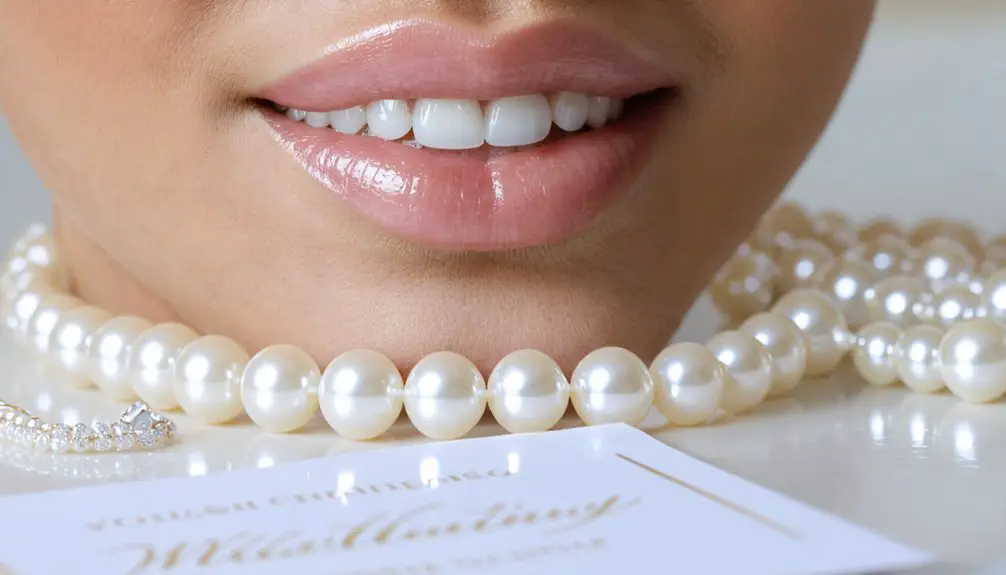
When preparing for a special event, strategic timing of your teeth whitening treatment can make the difference between a confident, camera-ready smile and potential discomfort or disappointment.
For best results, schedule your whitening at least two weeks before your event to allow time for any sensitivity to subside and results to stabilize.
Consider these essential event timing factors when planning your whitening techniques:
- Professional in-office treatments deliver results in about an hour, while at-home kits typically require two weeks
- Follow a “white diet” for 48 hours post-treatment to maintain your brightest smile
- Book your dental consultation well in advance to guarantee proper oral health and customize your treatment plan
Your brighter smile won’t just enhance photos – it’ll boost your confidence and help you engage more naturally with others during your special occasion.
Safety Considerations and Expert Recommendations
Since teeth whitening treatments involve powerful chemical agents, understanding proper safety protocols and expert guidance is vital for achieving excellent results while protecting your oral health.
Before starting any whitening treatment, you’ll need a dental consultation to assess your oral health and identify potential risks. Your dentist will help determine the most appropriate whitening method based on your specific needs.
To guarantee safe treatment, follow all recommended safety protocols carefully. Don’t exceed recommended application times or frequencies, and watch for signs of sensitivity or irritation.
If you’re using at-home products, choose those with the ADA Seal of Acceptance and strictly follow instructions. Remember that whitening isn’t suitable for everyone, particularly those with active gum disease, cavities, or severe tooth sensitivity, so professional guidance is essential for the best results.
The Long-Term Benefits of a Whiter Smile
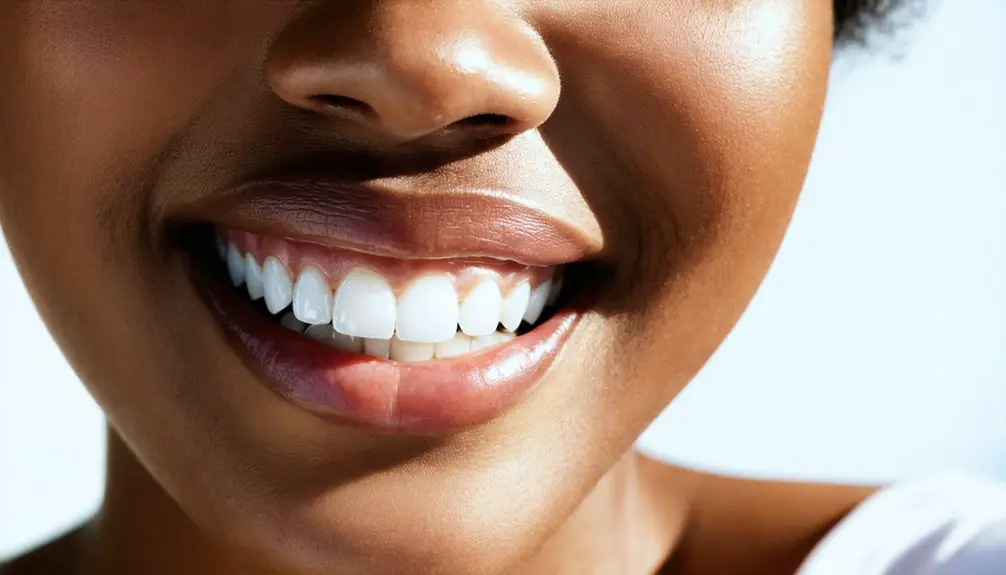
The decision to pursue teeth whitening delivers far more than a temporary cosmetic enhancement.
Teeth whitening creates lasting value beyond aesthetics, becoming a gateway to enhanced confidence and sustained personal transformation.
Beyond common whitening myths, research shows that a brighter smile creates lasting positive impacts on your personal and professional life. Your whiter teeth can greatly boost your confidence while improving aesthetic perceptions others have of you.
The long-term advantages of professional teeth whitening include:
- Enhanced self-esteem and social confidence that can last for months or years
- Improved oral health through regular dental monitoring and proper maintenance
- Better preservation of results when combined with good hygiene habits
You’ll find that maintaining whitened teeth encourages better overall self-care practices.
With proper professional treatment and consistent maintenance, you can enjoy sustained benefits that extend far beyond appearance, positively impacting your relationships, career opportunities, and personal well-being.
Creating Sustainable Oral Care Habits
You’ll find that maintaining your newly whitened smile requires establishing sustainable daily habits that protect both your oral health and the environment.
By choosing eco-friendly products like biodegradable toothbrushes and recyclable packaging while maintaining proper brushing techniques, you’re investing in long-term dental wellness.
Your commitment to twice-daily brushing with fluoride toothpaste, combined with mindful product choices, creates a foundation for lasting oral health results that align with environmental responsibility.
Daily Wellness Through Whitening
Modern teeth whitening practices offer far more than cosmetic benefits, serving as a gateway to improved daily wellness and sustainable oral care habits.
The whitening motivation you’ll gain creates a powerful drive to maintain excellent oral hygiene through consistent brushing and flossing. Professional treatments and at-home care work together to reduce harmful bacteria while promoting healthier habits.
- You’ll naturally become more mindful of dietary choices, avoiding staining foods and beverages that can compromise your bright smile.
- Your enhanced confidence will encourage more frequent dental visits and professional cleanings.
- The bacterial-fighting properties of whitening agents support your ongoing protection against cavities and gum disease.
Building Long-Term Smile Habits
Building sustainable oral care habits extends beyond achieving a whiter smile – it’s about creating lasting practices that benefit both your health and the environment.
You’ll protect your teeth alignment and smile aesthetics while reducing your environmental impact by choosing eco-conscious products like bamboo toothbrushes and natural toothpaste tablets.
Make your routine more sustainable by turning off the water while brushing and properly disposing of dental products.
Consider that your mouth harbors over 700 types of bacteria, making consistent care essential.
You can join the growing number of conscious consumers who prioritize both oral health and environmental stewardship.
Frequently Asked Questions
Can Teeth Whitening Remove Deep Stains Caused by Medications or Fluorosis?
You’ll find that deep stain removal from medications and fluorosis is challenging. While professional whitening can improve their appearance, it won’t completely eliminate these intrinsic stains within your tooth structure.
Will Teeth Whitening Work on Dental Crowns, Veneers, or Fillings?
No, teeth whitening won’t work on your dental restorations. Crowns, veneers, and fillings don’t respond to whitening options because they’re made of non-porous materials that can’t absorb bleaching agents.
How Soon After Dental Work Can I Start Teeth Whitening?
Like giving a fresh paint job time to dry, you’ll need to wait 7-14 days after fillings and 4-8 weeks after gum surgery before whitening to prevent dental sensitivity.
Is Teeth Whitening Safe During Pregnancy or While Breastfeeding?
You should avoid teeth whitening during pregnancy due to unknown risks to your baby. While breastfeeding, it’s safer but consult your healthcare provider first for personalized guidance.
Can Teenagers Undergo Professional Teeth Whitening Treatments?
You can safely undergo professional teeth whitening after age 14 when your permanent teeth have fully developed. For ideal teenage dental health, always consult a dentist to explore suitable whitening options.
References
- https://www.news-medical.net/news/20250812/Personality-predicts-who-stays-happy-with-a-smile-after-teeth-whitening.aspx
- https://www.schwimmerdental.com/blog/benefits-of-teeth-whitening
- https://pmc.ncbi.nlm.nih.gov/articles/PMC6290526/
- https://www.jaxsmilesdentistry.com/the-potential-of-teeth-whitening-for-mental-wellness/
- https://www.thedentalspajersey.com/blog/teeth-whitening-statistics-2024
- https://pmc.ncbi.nlm.nih.gov/articles/PMC12330114/
- https://montgomeryparkdentalcare.com/dentist/brighten-your-smile-boost-your-confidence-the-psychological-power-of-teeth-whitening/
- https://www.gilbertdentalcenter.com/the-psychology-of-a-white-smile-the-impact-of-teeth-whitening-on-confidence/
- https://drritapeck.com/psychological-benefits-of-teeth-whitening/
- https://www.alabamafamilydental.com/12-psychological-effects-of-teeth-whitening/
